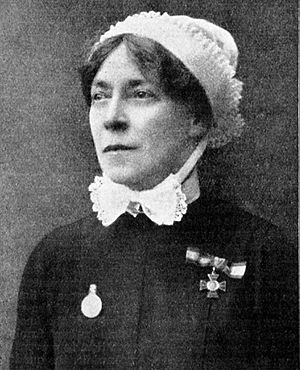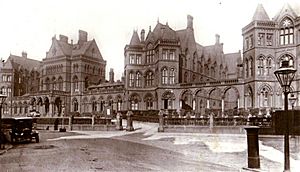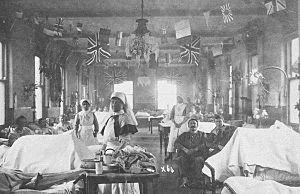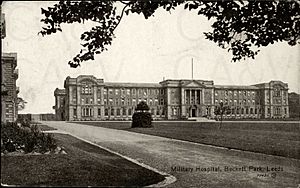Euphemia Steele Innes facts for kids
Quick facts for kids
Euphemia Steele Innes
|
|
|---|---|

Euphemia Steele Innes, c. 1916
|
|
| Born | 26 February 1874 Panbride, Angus, Scotland
|
| Died | 9 May 1955 (aged 81) Newington, Edinburgh, Scotland
|
| Years active | 1897 – c. 1938 |
| Known for | Founder of Leeds Nurses' League |
| Medical career | |
| Profession | Nurse |
| Institutions | Territorial Force Nursing Service Leeds General Infirmary 2nd Northern General Hospital Queen Alexandra's Army Nursing Board |
| Awards | Royal Red Cross |
| Signature | |
Euphemia Steele Innes (26 February 1874 – 9 May 1955) was an important Scottish nurse. She worked for 21 years as the main nurse, called a matron, at Leeds General Infirmary in England. She received a special award, the Royal Red Cross 1st class, in 1916. This was for her excellent work during the First World War with the Territorial Force Nursing Service.
Euphemia Innes was the daughter of a church minister. She trained at Leeds University. She worked as a nursing sister and assistant matron before becoming a matron. She was already a matron when she earned Leeds University's first Diploma in Nursing (DN) in 1921. This was a special achievement, as the university was just starting its official nursing diploma exams.
During the First World War, Innes was the principal matron at the 2nd Northern General Hospital in Leeds. Her job included making sure all the hospitals in Leeds that the army had taken over had enough nurses. She also started the Leeds Infirmary Nurses' League, a group for nurses.
Contents
Early Life and Family
Euphemia Steele Innes was born in Panbride, Scotland, on 26 February 1874. She was the oldest daughter of James Innes, a Free Church of Scotland minister. Her mother was Elizabeth Morris. Euphemia was named after her grandmother, Euphemia Steele.
Records from 1901, 1911, and 1921 show Innes living in staff housing at the Leeds General Infirmary. Later, she moved to London and then returned to Edinburgh after she retired. She never married. In 1929, she traveled by ship to New York City and then returned to Liverpool. Euphemia Innes passed away in Newington, Edinburgh, on 9 May 1955, after being ill for some time.
Her Nursing Career

Becoming a Nurse
In 1897, Euphemia Innes started her nursing training at Leeds University. She earned her Diploma in Nursing with honors in 1921. She received this diploma after working as a nurse for two decades. Leeds University gave her this first nursing diploma even though some people, like the Poor Law Guardians, thought nurses should not get higher education.
Innes worked in different nursing roles in Yorkshire. She was a casualty sister (in charge of the emergency room), a ward sister, a theatre sister (in the operating room), and a night superintendent. In 1907, she became an assistant matron at Halifax Royal Infirmary. From 1908, she was the principal matron for the Territorial Force Nursing Service.
She moved between hospitals, becoming assistant lady superintendent at Leeds General Infirmary in 1909. Then she was matron at Halifax Infirmary in 1912. Finally, she became the lady superintendent, or matron, of Leeds General Infirmary in May 1913. She held this important role for 21 years until 1934. She was chosen for this job from many applicants.
Nursing During Wartime
Just before the First World War began, Innes took part in a demonstration of how to treat military injuries. This happened in July 1914 in Nottinghamshire. During the war, Innes was the principal matron at the 2nd Northern General Hospital in Leeds. She was in charge of making sure all the Leeds hospitals taken over by the army had enough nurses. She stayed in this role until December 1934.
Royal Visits
In 1923, the Prince of Wales, who later became Edward VIII, visited Leeds. He wanted to meet people, not just see buildings. Euphemia Innes, as matron of the Leeds Infirmary, was among the important local people presented to him.
In August 1933, King George V and Queen Mary visited Leeds. A special guard of honor was formed for them at Leeds Town Hall. Euphemia Innes and the nurses from Leeds Infirmary formed one line. The King and Queen stopped to talk with Innes as they left the Town Hall.
Retirement
Towards the end of her career, Innes became ill. She retired from her matron position at the end of 1934. She was too unwell to attend her formal farewell. However, the hospital committee gave her a gift from many people who had contributed.
Leeds Infirmary Nurses' League
Innes started the Leeds Infirmary Nurses' League in 1925. This was a group for nurses who worked at the infirmary. In 1931, while Innes was its president, the League joined the National Council of Trained Nurses of Great Britain and Ireland. By 1932, the League had 200 members. In 1936, Innes helped raise money for Leeds General Infirmary from former nurses.
Speaking Up for Nurses
In 1925, Innes spoke to a special committee of the House of Commons. She represented the General Nursing Council, of which she was a member. She argued for changes to nursing exams and for nurses to be able to vote for their representatives on the General Nursing Council. Her suggestions were approved. In 1938, Innes was chosen to represent the National Council of Nurses of Great Britain at a big international conference in Edinburgh.
Important Groups She Joined
Euphemia Innes was a member of several important nursing organizations. These included:
- The Executive Committee of the Hospital Matrons' Association.
- The Council of the College of Nursing.
- The General Nursing Council for England and Wales (starting in 1922).
- The Queen Alexandra's Army Nursing Board (QAANB). This board was formed in 1918 to advise on army nursing.
In 1926, Innes wrote to a newspaper about nurses' salaries and the nursing profession. She explained that the College of Nursing had worked hard to improve conditions for nurses. This included better pay, working hours, and a retirement plan. She believed that nurses should be paid well. However, she also noted that nurses received many benefits for free, like housing, food, and training. She felt that the most important thing for a professional nursing group was to put the patients first.
Awards and Recognition
Euphemia Innes received the Royal Red Cross 1st Class award in January 1916. This honor was given to her for her dedicated service during the First World War. At that time, she was working at Beckett Park Hospital with the Territorial Force Nursing Service.
Images for kids
 | Victor J. Glover |
 | Yvonne Cagle |
 | Jeanette Epps |
 | Bernard A. Harris Jr. |




